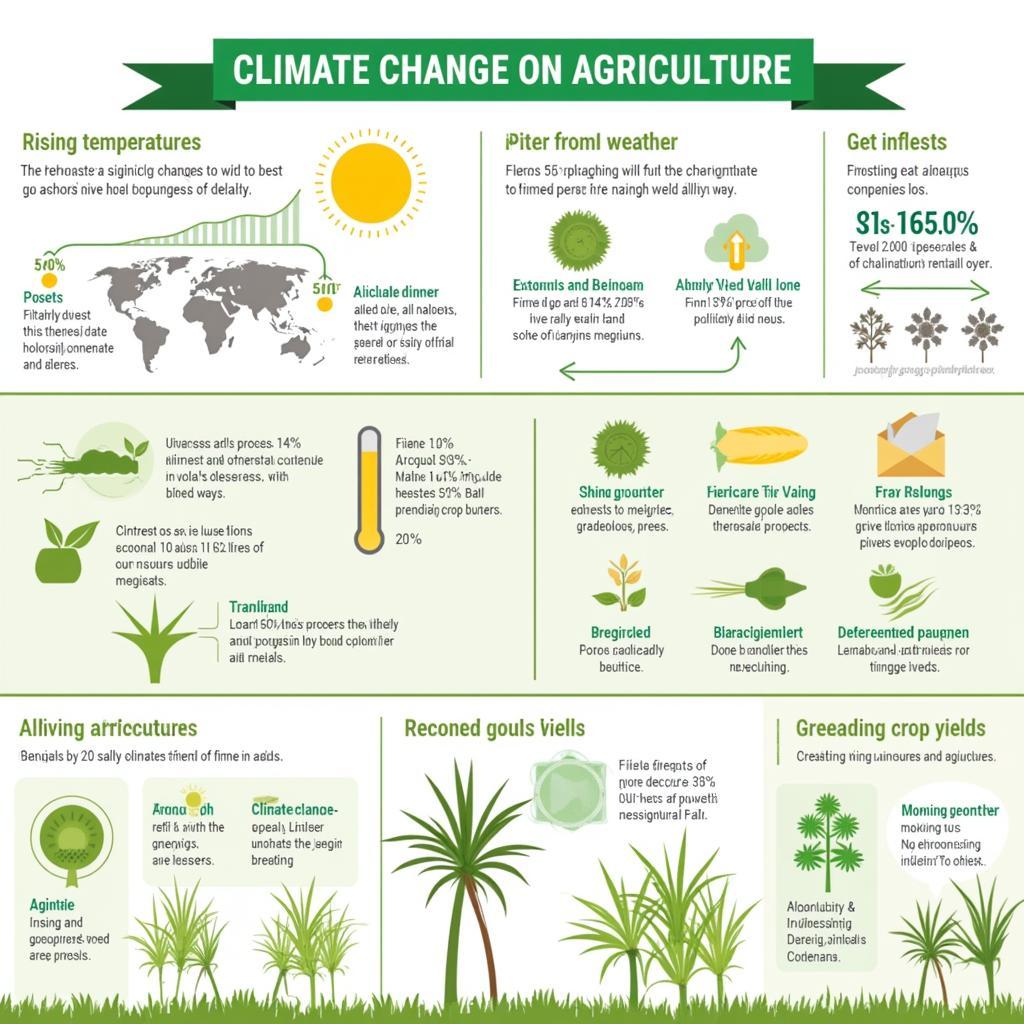Climate change and its impact on agriculture has become an increasingly common topic in IELTS Writing Task 2. Based on analysis of past exam questions, this theme appears in approximately 15-20% of environment-related tasks, particularly in countries where agriculture plays a significant economic role like India, China, and Vietnam. How does climate change affect agricultural productivity?
Let’s examine a recent IELTS question that exemplifies this topic:
Some people believe that climate change is the biggest threat to global food production. To what extent do you agree or disagree with this statement?
Question Analysis
This question requires candidates to:
- Take a clear position on whether climate change is the primary threat to food production
- Support their stance with relevant examples and evidence
- Consider potential counterarguments
- Provide a well-reasoned conclusion
 Climate change impacts on global food production systems and agricultural yields
Climate change impacts on global food production systems and agricultural yields
Sample Essay 1 (Band 8)
Climate change undoubtedly poses an unprecedented threat to global food security and agricultural productivity. I strongly agree that it represents the most significant challenge to worldwide food production, given its far-reaching and multifaceted impacts on farming systems.
The primary reason why climate change poses such a severe threat is its comprehensive impact on agricultural conditions. Rising temperatures and altered precipitation patterns directly affect crop yields and growing seasons. For instance, effects of drought on global economy have shown that extended dry periods in major grain-producing regions like Australia and the American Midwest have led to significant reductions in wheat and corn production. Moreover, unpredictable weather patterns make traditional farming calendars increasingly unreliable, forcing farmers to adapt their centuries-old practices.
Furthermore, climate change creates a cascade of secondary effects that compound its impact on food production. Rising sea levels contaminate coastal agricultural land with saltwater, rendering it unsuitable for conventional farming. Effects of climate change on food production are particularly evident in low-lying regions of Bangladesh and Vietnam, where rice production has declined significantly due to soil salinization. Additionally, changing climatic conditions alter the distribution and intensity of pest infestations and plant diseases, creating new challenges for crop protection.
While other factors like population growth and soil degradation also threaten food security, climate change amplifies these challenges. The synergistic effect of climate change with existing agricultural problems creates unprecedented challenges for global food systems. For example, impact of drought on food production combined with increasing water scarcity makes irrigation increasingly difficult in many regions.
In conclusion, climate change represents the most significant threat to global food production due to its pervasive effects and ability to exacerbate existing challenges. Urgent action is needed to both mitigate climate change and adapt agricultural practices to ensure future food security.
Sample Essay 2 (Band 6.5)
I agree that climate change is a major problem for global food production. This essay will discuss why climate change affects farming and food supply so much.
First, climate change makes the weather very unpredictable. When farmers don’t know when to plant or harvest crops, it becomes difficult to grow food properly. For example, many farmers in India face problems because the monsoon season has become irregular. This means their rice crops often fail or produce less food than before.
Another problem is that extreme weather happens more often. Floods and droughts destroy crops and make it hard to grow food. In countries like China, floods have ruined many farms and caused food prices to go up. How climate change affects food production and pricing shows that these problems affect everyone, not just farmers.
However, some people think other issues like population growth are bigger problems. While these are important too, climate change makes them worse. When there are both more people and less food because of climate change, it creates a very serious situation.
In conclusion, I believe climate change is the biggest threat to food production because it affects farming in many ways and makes other problems worse. Governments need to help farmers adapt to these changes and try to stop climate change from getting worse.
Band Score Analysis
Band 8 Essay Analysis
- Task Response (8): Clear position, fully developed arguments, relevant examples
- Coherence/Cohesion (8): Logical organization, effective paragraphing, smooth transitions
- Lexical Resource (8): Wide vocabulary range, precise word choice, good collocations
- Grammar (8): Complex structures, good control, minor errors only
Band 6.5 Essay Analysis
- Task Response (7): Clear position but less developed ideas
- Coherence/Cohesion (6): Basic organization, some repetition
- Lexical Resource (6): Limited range, some imprecise word choice
- Grammar (7): Mix of simple and complex structures, occasional errors
Key Vocabulary
- Agricultural productivity (n.) /ˌæɡrɪˈkʌltʃərəl prɒdʌkˈtɪvɪti/ – The measure of farming output
- Precipitation patterns (n.) /prɪˌsɪpɪˈteɪʃən ˈpætənz/ – Regular distribution of rainfall
- Soil salinization (n.) /sɔɪl ˌsælɪnaɪˈzeɪʃən/ – Process of salt accumulation in soil
- Synergistic effect (n.) /ˌsɪnəˈdʒɪstɪk ɪˈfekt/ – Combined impact greater than individual effects
- Food security (n.) /fuːd sɪˈkjʊərɪti/ – Reliable access to sufficient food
Consider practicing with these similar topics:
- The role of technology in addressing climate-related agricultural challenges
- The impact of changing weather patterns on traditional farming methods
- Solutions for maintaining food security in a changing climate
Share your practice essays in the comments section for feedback and discussion.


